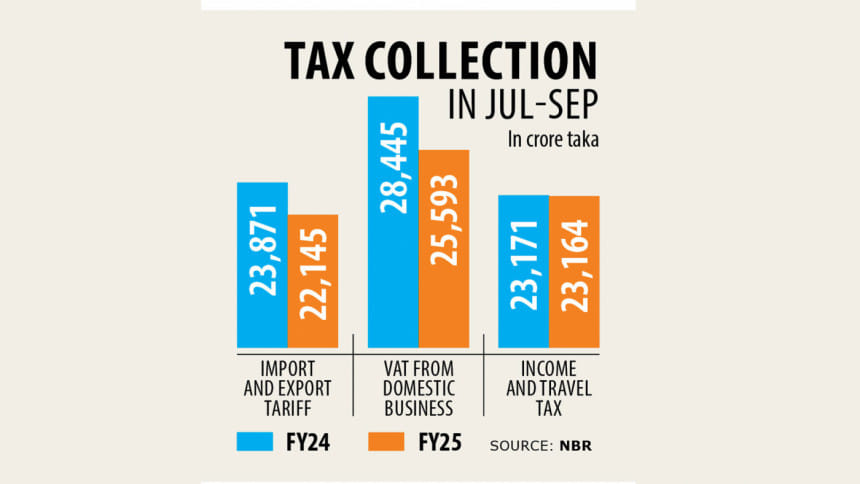Revenue receipts fall 6% in Jul-Sep

Revenue collection in the first quarter of the current fiscal year showed a 6 percent year-on-year decline, raising concerns that the interim government's fiscal space may be squeezed further amid the contractionary monetary policy.
The National Board of Revenue (NBR) logged Tk 70,903 crore in the July-September period of fiscal year (FY) 2024-25, missing its target for the three months by around Tk 25,597 crore.
The tax administration aims to collect Tk 480,000 crore in revenue by the end of this fiscal year.
The interim government will not cut the target for this fiscal year, which was set by the previous regime, Finance Adviser Salehuddin Ahmed said last month.
"The slowdown in revenue collection in July-September was mostly driven by political unrest, which resulted in economic uncertainties," said Ashikur Rahman, principal economist at the Policy Research Institute (PRI) of Bangladesh.
The World Bank has already reduced Bangladesh's growth forecast for the current year to 4 percent and it is still evident that there is a lack of coherence within the civil bureaucracy, he added.
Besides, recurring strikes and unrest regarding various issues are keeping political uncertainties very much alive.
"This undermines the momentum within the economy, which in turn weakens revenue collection," Rahman said.
Consequently, the interim government must establish a firm grip on law and order and reduce economic uncertainties associated with political instability.
Rahman added that the Ministry of Finance and NBR must identify low-hanging fruit that can expedite revenue collection in the very short term, especially by targeting the revenue lost due to tax expenditures.
Towfiqul Islam Khan, a senior research fellow at the Centre for Policy Dialogue, said the lower revenue collection would squeeze the interim government's fiscal space, which may force it to curtail the development budget.
Currently, the central bank is utilising a contractionary monetary policy to fight inflationary pressures, which means the government is unlikely to run a budget deficit.
When a government spends more than it collects in tax revenues, there is a budget deficit. Conversely, if there is more collected than spent, there is a surplus.
In addition, the government has to exempt duties on some commodities for inflation and the overall import may be reduced significantly.
"The government must now consider how to defend marginalised and smaller groups," Khan said.
Amid the transitional period, the economy is expected to slow down this year. But the government must devise a strategy depending on the extent of the slowdown, he said.
"A revision of the budget will be required by December."
Khan also suggested the government focus on framing the budget properly and take strict steps to curb tax evasion.
The year-on-year drop in revenue generation emanated from all three of the NBR's wings -- income tax, value-added tax and customs duties.
Except for travel tax and export duty, all taxes witnessed negative growth in the first quarter of FY25.
The collection of duties from international trade fell 7.23 percent to Tk 22,145 crore as the political turmoil led to a fall in imports.
Meanwhile, income tax receipts declined by 0.3 percent to Tk 23,164 crore. The collection of value-added tax, the biggest source of revenue, fell 10 percent to Tk 25,594 crore.

 For all latest news, follow The Daily Star's Google News channel.
For all latest news, follow The Daily Star's Google News channel. 



Comments